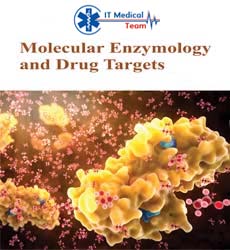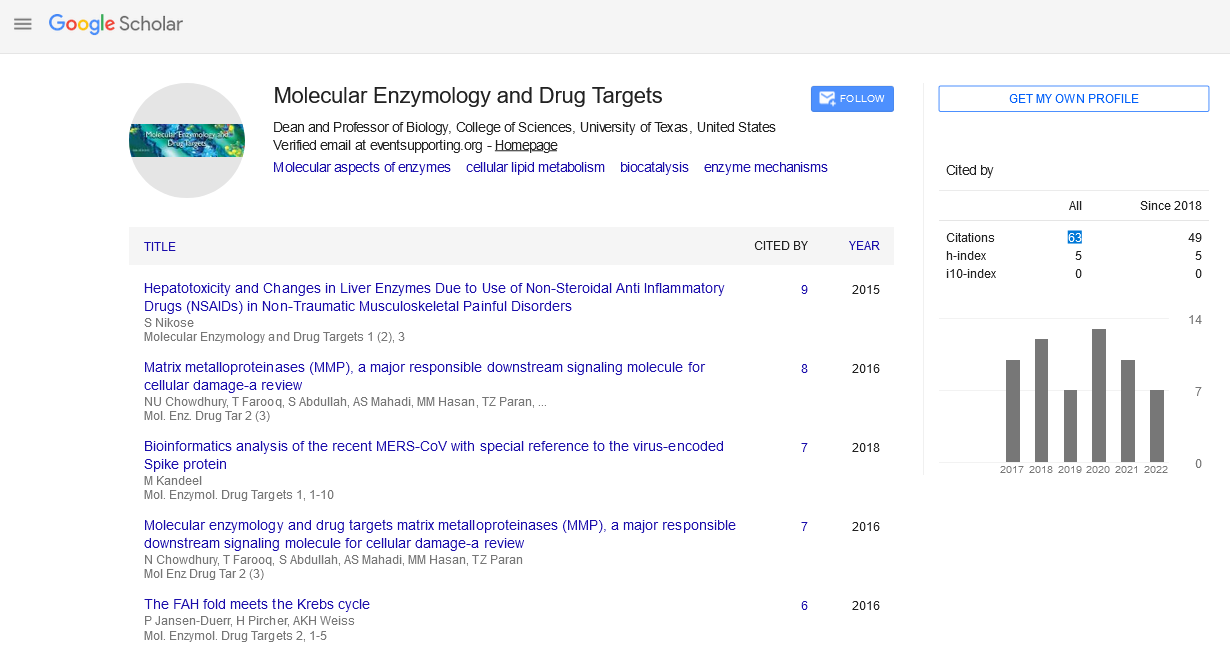Editorial - (2023) Volume 9, Issue 4
Biotechnological and Pharmaceutical Applications of Genetic Insights in Chronic Kidney Disease Management
Mariyam Khan*
Department of Enzymology, University of Pakistan, Pakistan
*Correspondence:
Mariyam Khan, Department of Enzymology, University of Pakistan,
Pakistan,
Email:
Received: 03-Aug-2023, Manuscript No. IPMEDT-23-14015;
Editor assigned: 07-Aug-2023, Pre QC No. P-23-14015 ;
Reviewed: 22-Aug-2023, QC No. Q-14015;
Revised: 25-Aug-2023, Manuscript No. R-14015;
Published:
31-Aug-2023
Abstract
Chronic Kidney Disease (CKD) poses a significant global health burden,
necessitating innovative approaches for effective management. This
article explores the integration of genetic insights into biotechnological
and pharmaceutical strategies for enhancing CKD management.
Genetic factors play a pivotal role in CKD susceptibility, progression,
and response to treatments. Advances in genetic research have led
to the identification of key genetic markers associated with CKD risk
and progression. Leveraging this knowledge, biotechnological and
pharmaceutical interventions are being tailored to individual genetic
profiles, ushering in a new era of precision medicine for CKD. This
article delves into the application of biotechnological tools, such
as genome-wide association studies (GWAS) and next-generation
sequencing (NGS), in identifying genetic variants linked to CKD. It
also discusses how these insights are being harnessed to develop
innovative pharmaceutical therapies targeting specific genetic pathways
implicated in CKD pathogenesis. Additionally, the article highlights
the potential of pharmacogenomics in predicting drug responses
and adverse reactions among CKD patients, optimizing treatment
outcomes while minimizing side effects. Furthermore, the integration of
bioinformatics and computational modeling is explored, demonstrating
how these approaches aid in deciphering complex genetic interactions
and predicting disease trajectories. The article showcases case
studies that illustrate the successful translation of genetic insights
into biotechnological advancements, such as the development of
personalized therapeutic regimens and the identification of novel
drug targets. As the era of personalized medicine gains momentum,
the amalgamation of genetic knowledge with biotechnological and
pharmaceutical advancements holds immense promise for reshaping the
landscape of CKD management. This article underscores the pivotal role
that genetics plays in driving innovative solutions for CKD, ultimately
leading to improved patient outcomes, reduced healthcare costs, and a
brighter future for those affected by this debilitating condition.
Keywords
Treatment optimization; Genetic pathways; Genetic
susceptibility; Patient outcomes
INTRODUCTION
Chronic Kidney Disease (CKD) stands as a formidable
global health challenge, affecting millions of individual’s
worldwide and straining healthcare systems with its
complex and multifaceted nature [1]. The pursuit of
improved CKD management has driven researchers
and clinicians to explore novel avenues that leverage
biotechnological and pharmaceutical advancements [2].
In recent years, the integration of genetic insights into
the realm of CKD management has emerged as a pivotal
strategy, offering the promise of precision medicine
tailored to individual patients' genetic profiles [3]. Genetic
factors intricately intertwine with CKD susceptibility,
progression, and treatment response, imparting a distinct
genetic signature to each patient's journey with the disease.
The advances in genetic research, including breakthroughs
in genome-wide association studies (GWAS) and nextgeneration
sequencing (NGS), have uncovered key genetic
markers associated with CKD risk and progression [4].
These discoveries lay the foundation for a transformative
approach to CKD management, one that capitalizes on
biotechnological tools and pharmaceutical innovations to
revolutionize patient care [5]. This article embarks on an
exploration of the biotechnological and pharmaceutical
applications stemming from genetic insights in the realm
of CKD management. By unraveling the complex genetic
landscape of CKD, researchers are unveiling opportunities
to develop targeted interventions that address the underlying
genetic pathways driving the disease. Furthermore, the
integration of pharmacogenomics, a discipline that
delves into the genetic basis of drug responses, holds the
potential to individualize treatment regimens, enhancing
efficacy while minimizing adverse effects. The convergence
of genetic knowledge with cutting-edge biotechnological
tools and pharmaceutical strategies signifies a paradigm
shift in CKD management [6]. By honing in on specific
genetic variants and pathways, researchers and clinicians are
carving a path towards personalized therapeutic approaches
[7]. Additionally, the integration of bioinformatics and
computational modeling provides a lens through which
intricate genetic interactions can be deciphered, guiding
treatment decisions and predicting disease trajectories.
As the field of personalized medicine gains momentum,
the symbiosis between genetic insights, biotechnological
advancements, and pharmaceutical innovations presents
a transformative trajectory for CKD management. This
article navigates through the unfolding landscape of CKD
management, spotlighting the pivotal role that genetics
plays in shaping innovative solutions. With a focus on improved patient outcomes, reduced healthcare costs,
and enhanced quality of life for those affected by CKD,
the integration of genetic insights holds the promise of
a brighter and more tailored future for chronic kidney
disease management [8].
DISCUSSION
The convergence of biotechnological and pharmaceutical
advancements with the insights gleaned from genetics has
sparked a new era of innovation in the realm of Chronic
Kidney Disease (CKD) management. This discussion
reflects upon the multidimensional implications,
challenges, and transformative outcomes that emerge from
the harmonious integration of these domains [9]. At the
heart of this paradigm shift lays a deeper understanding
of the intricate relationship between genetics and CKD.
Genetic insights have unveiled a tapestry of genetic
markers, variants, and pathways intricately linked to CKD
susceptibility, progression, and response to treatment
[10]. This newfound knowledge extends beyond the
conventional diagnostic boundaries, offering a path
towards precision medicine strategies tailored to individual
patients' genetic profiles. Biotechnological applications play
a pivotal role in harnessing the power of genetics for CKD
management. Genome-wide association studies (GWAS)
and next-generation sequencing (NGS) have emerged as
potent tools, unraveling the complex genetic landscape
underlying CKD [11]. By identifying genetic signatures
associated with disease susceptibility and progression,
these tools lay the foundation for novel therapeutic targets,
biomarkers, and pathways that may hold the key to
effective interventions. The integration of pharmaceutical
innovations further amplifies the impact of genetic insights.
Pharmacogenomics, an emerging discipline, capitalizes
on genetic factors to predict individual responses to
medications. By tailoring drug selection and dosages based
on genetic profiles, pharmaceutical interventions become
more targeted, thereby increasing efficacy and minimizing
adverse effects. This approach, once a distant aspiration is
now a tangible reality, poised to transform the landscape
of CKD treatment. Personalized therapeutic regimens,
guided by genetic insights, emerge as a cornerstone of this
revolution. With the ability to predict how patients will
respond to specific drugs, clinicians can craft treatment
plans that are optimized for each individual's genetic
makeup. This shift from a generalized approach to a tailored
one holds the potential to significantly enhance treatment
outcomes, reduce adverse reactions, and ultimately improve
patients' quality of life. The power of bioinformatics
and computational modeling shines through as these
technologies aid in deciphering the complexity of genetic
interactions within CKD. The intricate web of genetic
factors influencing disease progression and treatment
responses can be unravelled, offering insights that shape
clinical decision-making. These tools not only assist in
identifying potential therapeutic targets but also facilitate
predictive modeling, enabling healthcare providers to
anticipate disease trajectories and optimize treatment
plans. While the integration of biotechnological and pharmaceutical applications with genetic insights heralds
a promising future, it is not devoid of challenges. Ethical
considerations, data security, scalability, and the translation
of research findings into clinical practice represent hurdles
that necessitate careful consideration.
CONCLUSION
In conclusion, the amalgamation of biotechnological and
pharmaceutical applications with the insights derived from
genetics marks a pivotal turning point in the landscape of
Chronic Kidney Disease (CKD) management. The journey
through this exploration has illuminated the profound
potential of harnessing genetic insights to tailor precision
interventions, ultimately revolutionizing how CKD is
understood, diagnosed, and treated. The fusion of genetics
with cutting-edge biotechnological tools, such as genomewide
association studies (GWAS) and next-generation
sequencing (NGS), has unveiled a treasure trove of
genetic markers and pathways intricately linked to CKD's
intricacies. This wealth of knowledge lays the foundation
for personalized therapeutic regimens that target the core
genetic underpinnings of the disease, offering a level
of precision that was once beyond imagination. The
collaboration of pharmaceutical innovations with genetic
insights has translated genetic findings into tangible clinical
benefits. The concept of pharmacogenomics, driven by
individualized responses to medications based on genetic
makeup, exemplifies the embodiment of precision medicine
in CKD treatment. This tailored approach not only
enhances treatment outcomes but also minimizes adverse
effects, fostering a higher quality of life for CKD patients.
The integration of bioinformatics and computational
modeling deepens our understanding of the intricate genetic
interactions influencing CKD, empowering clinicians with
predictive capabilities to optimize treatment plans and
anticipate disease trajectories. As with any transformative
endeavour, challenges accompany these advancements.
Ethical considerations, data security, and the dissemination
of genetic insights into clinical practice warrant ongoing
attention. However, these challenges pale in comparison
to the profound potential that this convergence holds.
The landscape of CKD management is evolving from a
one-size-fits-all approach to a tailored, patient-centric
paradigm. This journey is fueled by the harmonious
symphony of genetics, biotechnology, and pharmaceutical
science. In this new era of CKD management, patients
stand to benefit immensely as their treatment journeys
become characterized by precision, efficacy, and minimal
side effects. The collaborative efforts of genetic researchers,
biotechnologists, pharmaceutical experts, and clinicians
herald a future where CKD is managed not only with
medical expertise but with a deep understanding of the
individual genetic makeup. As the dawn of personalized
medicine rises, the integration of biotechnological and
pharmaceutical applications with genetic insights promises
a brighter future for CKD patients and exemplifies the
remarkable potential of multidisciplinary innovation in the
realm of healthcare.
REFERENCES
- Chakrabarty A, Hydros S, Puliyel JM, et al. Smuggling contraband drugs using paediatric “body packers. Arch Dis Child. 2006;91(1):51.
Indexed at, Crossref, Google Scholar
- Low VHS, Killius JS. Vegetable, or mineral: A collection of abdominal and alimentary foreign bodies. Esophagus. 2000;4:6-8.
Crossref, Google Scholar
- Takekawa K, Ohmori T, Kido A, et al. Methamphetamine body packer: acute poisoning death due to massive leaking of methamphetamine. J Forensic Sci. 2007; 52:1219-1222.
Indexed at, Crossref, Google Scholar
- Jakhar JK, Dhattarwal SK, Aggarwal AD, et al. Heroin body packer’s death in Haryana; India: A case report. J Forensic Legal Med. 2013; 20:693-696.
Indexed at, Crossref, Google Scholar
- Birchal M, Marres HP. “Ear packing” in drug abusers. BMJ. 1989; 299:214.
Crossref, Google Scholar
- Traub SJ, Hoffman RS, Nelson LS, et al. Body packing: the internal concealment of illicit drugs. N Engl J Med. 2003; 349(26):2519-2526.
Indexed at, Crossref, Google Scholar
- Pinto A, Reginelli A, Pinto F, Sica G, et al. Radio-logical and practical aspects of body packing. Br J Radiol 2014; 87(1036).
Indexed at, Crossref, Google Scholar
- Niewiarowski S, Gogbashian A, Afaq A, et al. Abdominal X-ray signs of intraintestinal drug smuggling. J Forensic Leg Med. 17(4):198-202.
Indexed at, Crossref, Google Scholar
- Sica G, Guida F, Bocchini G, et al. Imaging of drug smuggling by body packing. Semin Ultras CT MR. 2015; 36(1):39-47.
Indexed at, Crossref, Google Scholar
- Bulakci M, Kalelioglu T, Bulakci BB, et al. Comparison of diagnostic value of multidetector computed tomography and X-ray in the detection of body packing. Eur J Radiol.2013; 82(8):1248-54.
Indexed at, Crossref, Google Scholar
- Mandava N, Chang RS, Wang JH, et al. Establishment of a definitive protocol for the diagnosis and management of body packers (drug mules). Emerg Med J. 2011; 28:98e101.
Indexed at, Crossref, Google Scholar





